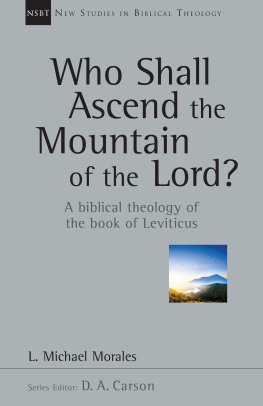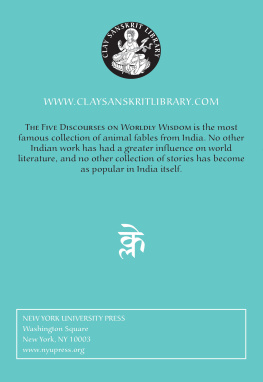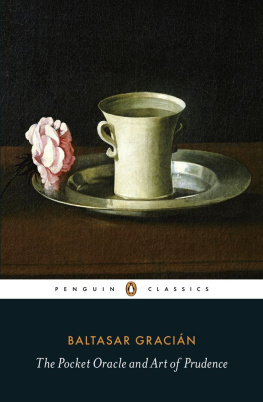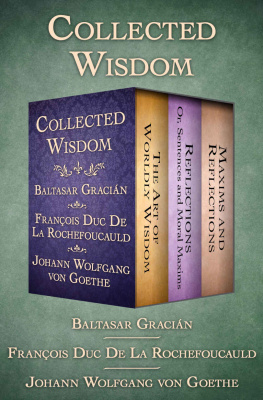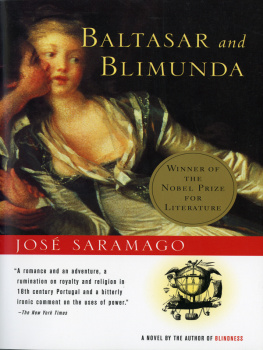Baltasar Gracián y Morales - The Art of Worldly Wisdom
Here you can read online Baltasar Gracián y Morales - The Art of Worldly Wisdom full text of the book (entire story) in english for free. Download pdf and epub, get meaning, cover and reviews about this ebook. year: 1992, publisher: Currency/Doubleday, genre: Romance novel. Description of the work, (preface) as well as reviews are available. Best literature library LitArk.com created for fans of good reading and offers a wide selection of genres:
Romance novel
Science fiction
Adventure
Detective
Science
History
Home and family
Prose
Art
Politics
Computer
Non-fiction
Religion
Business
Children
Humor
Choose a favorite category and find really read worthwhile books. Enjoy immersion in the world of imagination, feel the emotions of the characters or learn something new for yourself, make an fascinating discovery.

- Book:The Art of Worldly Wisdom
- Author:
- Publisher:Currency/Doubleday
- Genre:
- Year:1992
- Rating:4 / 5
- Favourites:Add to favourites
- Your mark:
- 80
- 1
- 2
- 3
- 4
- 5
The Art of Worldly Wisdom: summary, description and annotation
We offer to read an annotation, description, summary or preface (depends on what the author of the book "The Art of Worldly Wisdom" wrote himself). If you haven't found the necessary information about the book — write in the comments, we will try to find it.
The Art of Worldly Wisdom — read online for free the complete book (whole text) full work
Below is the text of the book, divided by pages. System saving the place of the last page read, allows you to conveniently read the book "The Art of Worldly Wisdom" online for free, without having to search again every time where you left off. Put a bookmark, and you can go to the page where you finished reading at any time.
Font size:
Interval:
Bookmark:
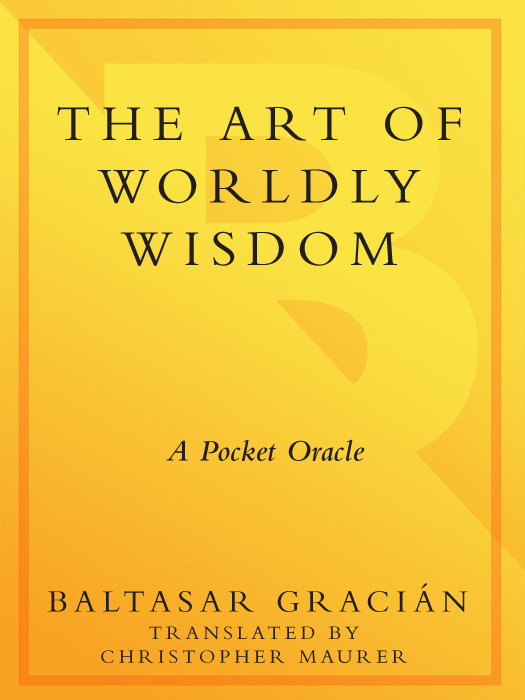
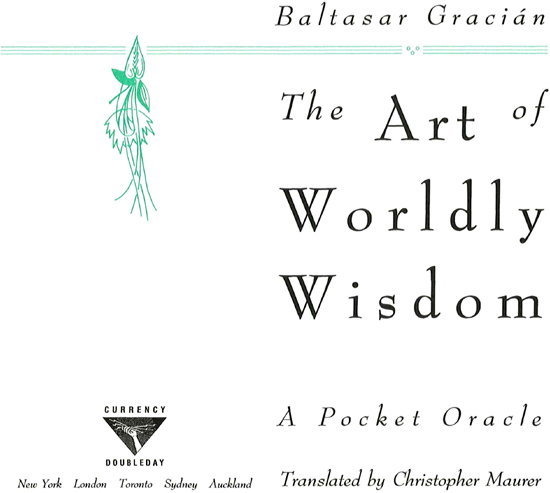
The Art of Worldly Wisdom: A Pocket Oracle is a book of strategies for knowing, judging, and acting: for making ones way in the world and achieving distinction and perfection. It is a collection of three hundred aphorisms too delicious not to share with friends and colleagues, too penetrating not to hide from enemies and rivals. Its ideal reader is someone whose daily occupation involves dealing with others: discovering their intentions, winning their favor and friendship, or (on the other hand) defeating their designs and checkmating their will. Like all aphorisms, these are meant to be read slowly, a few at a time.
The Pocket Oracle revolves around a duality dear to the seventeenth century and to our own: it sees life as warfare involving both being and seeming, both appearance and reality. It provides advice not only for modern image makers and spin doctors, but also for the candid: for those who insist that substance, not image, is what really matters. Do, but also seem, is Gracins pithy advice (aphorism 130). It assumes that good people are those most easily duped (21)sheep in the midst of wolvesand it teaches us to temper the innocence of the dove with the wisdom of the serpent, governing ourselves according to the way people are, rather than the way they would like to be or to appear.
The Oracle has spoken in many tongues, has been heard with admiration and greeted with praise. It was imitated by La Rochefoucauld (who learned of it in the salon of his friend Mme de Sabl), valued by writers as diverse as Joseph Addison and Friedrich Nietzsche, and lovingly translated into German by Arthur Schopenhauer. Nietzsche observed that Europe has never produced anything finer or more complicated in matters of moral subtlety, and Schopenhauer believed the Oracle absolutely unique
It teaches the art which all would fain practice, and is therefore a book for everyone; but it is especially fitted to be the manual of those who live in the great world, and peculiarly of young people who wish to prosper in that world. To them it gives at once and beforehand that teaching which they could otherwise only obtain through long experience. To read it once through is obviously not
What sort of person composed these strategies for perfection? The voice that emerges from the Oracle is not, as some have argued, an entirely cynical, Machiavellian one. Baltasar Gracin (1601-1658), a worldly Jesuit priest, felt undying hatred for human folly. But the Oracle insists on the perfectability of man and the capacity of goodness, assisted by art, to triumph over evil. Gracin assumes, without saying so, that God helps those who help themselves.
What is disconcertingly modern about this book
Nor can Gracin be accused of indifference to the spiritual or material well-being of others. Avoid fools, he tells us repeatedly, but beyond that his injunctions are clear: Speak what is very good, do what is very honorable (202). Know how to do good: little by little, with moderation (255). Love, if you would be loved. Friendship is a recurrent theme, both here and in Gracins other works, as it was in his life, and so is conversation. As for the pessimism of which he is often accused, the concept is anachronistic. What many of us call optimisma belief that people are basically good and that things will turn out for the bestGracin would have regarded as a hoax of the imagination: Hope is a great falsifier. Let good judgment keep her in check (19).
Like other moralists of his age, from Francis Bacon and Jeremy Taylor to Francisco de Quevedo, Gracin labored painfully toward desengao, the state of total disenchantment or disillusionment in which one gains control of ones hopes and fears, overcomes deceitful appearances and vain expectations, and weans oneself from false worldly values. Much of the Oracle, with its insistence on curbing the imagination, concerns strategies for reaching that bittersweet beatitude. To entertain no illusions about things or people was a large part of wisdom. The modern notions of pessimism and optimism seem shallow in comparison. Optimism would have seemed out of place, anyway, in seventeenth-century Spainthe Spain of Velsquez and Zurbarna kingdom in social turmoil and political decline. Like Quevedo, Gracin had the sense that his countrys moral strength was waning. From time to time we hear a melancholy, unmistakably elegiac sigh: Good conduct has departed, debts of gratitude now go unpaid, and few people give others the treatment they deserve (280). Only strategyincessant plotting against ones own weaknesses and those of othersallows us to push forward to perfection. It takes more to make one sage today than it did to make the seven of Greece (1).
What of Gracins own life, his own struggle toward worldly wisdom? It was not, as so many have written, an entirely uneventful one. He was born in 1601 in Belmonte, a village in Aragn,went bravely to the front lines and, he says proudly in a letter, exhorted the troops as they went into battle. The soldiers hailed him, he says, as el Padre de la Victoria.
When he extols friendship as a pleasant way to acquire learning (11), he is thinking, no doubt, of blissful hours spent in the salon and library of his friend and protector Vicencio Juan de Lastanosa, six years younger than he, one of the wealthiest and most learned of seventeenth-century Spanish humanists. Lastanosa was patron of an important literary and cultural athenaeum, a true microcosm of all human learning, and it would be difficult to exaggerate his importance to Gracin. Gracins first assignment after he took his vows was to the Jesuit College at Huesca, an ancient town to the northeast of Zaragoza. From the college it was only a few tempting steps to the Lastanosa mansion, an astoundingly rich Baroque museum of books and manuscripts, paintings (Titian, Drer, Tintoretto, Ribera), sculpture, and objects of classical antiquity; there were, Lastanosa once wrote, more than eight thousand coins and medals of Greek and Roman emperors and two thousand cameos and stones from ancient rings.than half a century. There was even a small zoological garden: in four caves, behind strong bars, were a tiger, a leopard, a bear and a lion. In a cage, two voracious ostriches. To Lastanosas literary and cultural treasures, Gracin was granted access: an incalculable boon for one who thirsted for esthetic perfection and infallible taste, and hungered to be vulgar in nothing (28). It was Lastanosa who paid for the publication of several of Gracins books, and many of the aphorisms of The Art of Worldly Wisdom may have been tried out for the first time on listeners in his salon.
The records of the Jesuits give us a glimpse of Gracin as priest and administrator, and he seems less stern, less forbidding in those pages than in these. In 1637, for example, he is rebuked for having been too lenient toward a fellow Jesuit guilty of weakness (flaqueza) with the opposite sex. A year later, the general of the Jesuit order suggests, from Rome, that Padre Gracin be reassigned: because he is a cross and a burden to his superiors, a source of problems and disturbances , and because, displaying little prudence, he has been caring for the child of one who has left the order, asking for money to support him; and [also] because he has published a book, under the name of a brother of his.
The book alluded to is his first,
Font size:
Interval:
Bookmark:
Similar books «The Art of Worldly Wisdom»
Look at similar books to The Art of Worldly Wisdom. We have selected literature similar in name and meaning in the hope of providing readers with more options to find new, interesting, not yet read works.
Discussion, reviews of the book The Art of Worldly Wisdom and just readers' own opinions. Leave your comments, write what you think about the work, its meaning or the main characters. Specify what exactly you liked and what you didn't like, and why you think so.



